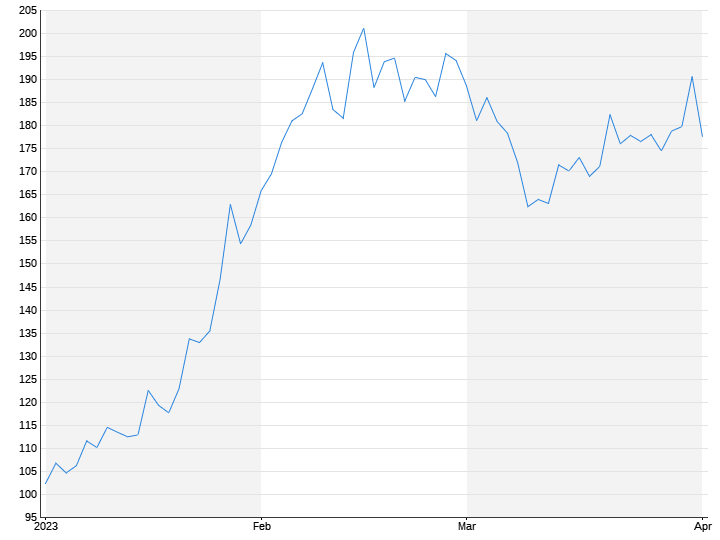Dow Jones closes in positive territory
Throttling of oil production causes prices to swing
04/03/2023, 10:40 p.m
Demand for energy stocks continues to rise as the Opec+ cartel plans to cut oil, with Chevron and ExxonMobil gaining. A big loser is carmaker Tesla, which suffered a price drop in the first quarter despite record deliveries.
Rising oil prices following a production cut by the Opec+ oil cartel have sparked mixed reactions on Wall Street. The resulting fear of a renewed surge in inflation and longer rising interest rates weighed on technology stocks at the start of the week and depressed the Nasdaqindex by 0.27 percent to 12,189.45 points. On the other hand, oil companies like Chevron benefited from the price jump and left it Dow JonesIndex rise by almost one percent to 33,601.15 points. The broader one S&P 500 rose by 0.37 percent to 4124.51 points.
“The cut in oil production is creating pretty strong demand for energy stocks, which have gotten pretty cheap over the past few months,” said George Cipolloni, portfolio manager at Penn Mutual Asset Management. Saudi Arabia and other member countries of the oil association Opec+ surprised the markets on Sunday by announcing that they would cut oil production.
As in Europe earlier, higher oil prices fueled demand for energy stocks. The US oil giants chevrons and ExxonMobil increased by 4.16 and 5.89 percent, respectively. The jump in oil prices initially fueled speculation that the US Federal Reserve would continue to raise interest rates in its fight against inflation. “We could see inflation bottoming out a little higher than expected, which could mean the Fed will continue raising rates much longer and further than many are currently expecting,” said Paul Nolte, market strategist at Murphy & Sylvest.

US industry accelerated its slide in March. The US construction sector also developed worse than expected. This made market traders bet that the end of the rate hikes is near. Meanwhile, the electric car manufacturer pushed the individual values Tesla into the limelight, whose titles slumped 6.12 percent despite record first-quarter shipments. Stockbrokers became increasingly concerned about the group’s profit margin because aggressive price cuts only moderately boosted demand. Analysts at Barclays, for example, warned that the inventory build-up could necessitate further price cuts. Bernstein’s experts also expected further price reductions in order to meet the delivery targets. Growing competition and the gloomy economic prospects weighed on demand.
Shares also flew out of the investors’ depots Rivian Automotive. The shares of the US electric car manufacturer fell by 1.58 percent because the group was disappointed in the past quarter due to problems in the supply chain in production.
